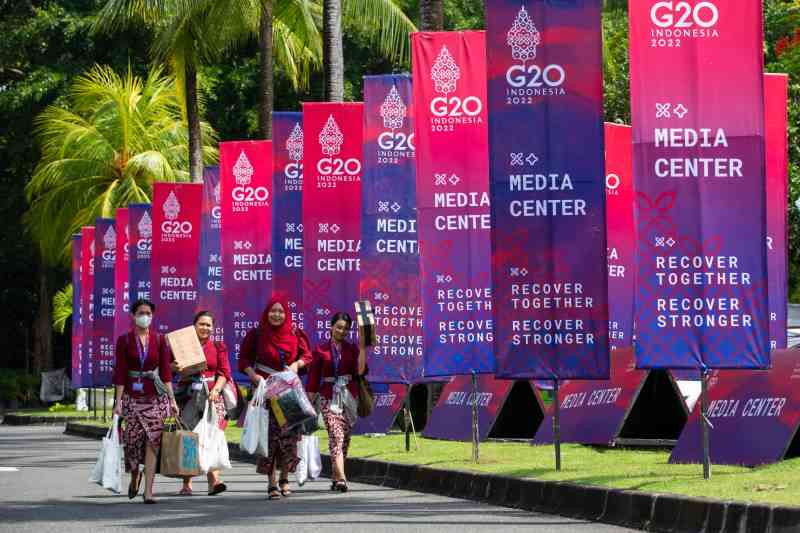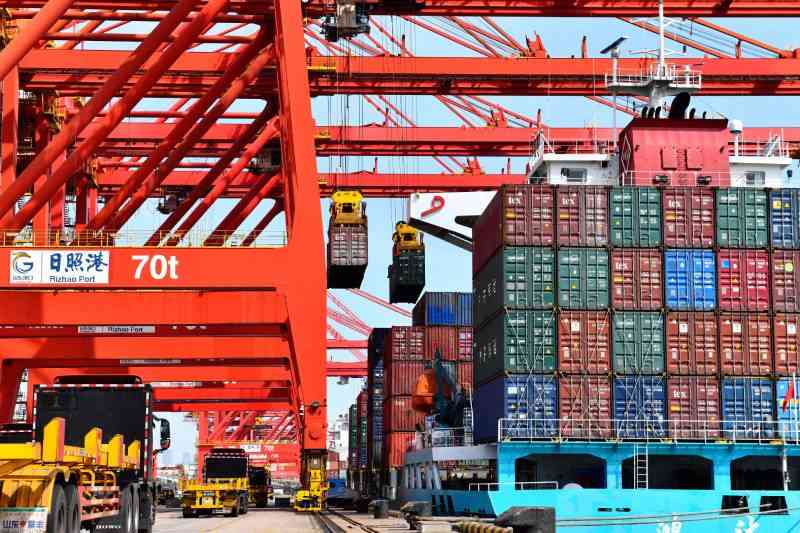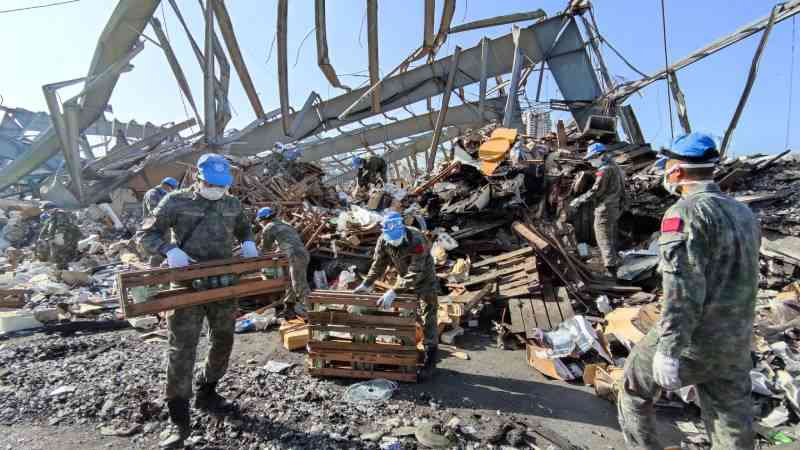
Audio By Vocalize

"What has happened to the world and how should we respond?"
As early as 2017, Chinese President Xi Jinping put forward this thought-provoking question in his speech at the UN Office in Geneva. He also offered China's vision of building a human community with a shared future to secure development and peace for generations.
This appeal is even more valid today, as the global community faces more complex challenges, not least the COVID-19 pandemic's lingering impacts, regional conflicts and headwinds against economic globalization.
As the Group of 20 (G20) leaders gather this week to discuss how to tackle world problems at the 17th G20 Summit in Indonesia, Xi is expected to present once again China's answers to the fundamental question hanging over the world. 
Common development
Over the past decade, China has seen remarkable growth, with its GDP rising from 53.9 trillion yuan (7.58 trillion U.S. dollars) in 2012 to 114.4 trillion yuan (16.09 trillion dollars) in 2021. And the world's second-largest economy has taken on a more significant role on the world stage.
China is also making relentless efforts to promote common development worldwide. The Belt and Road Initiative (BRI) it proposed in 2013 endeavors to share its development dividends with other countries through infrastructure connectivity.
Through the end of 2021, the total volume in the trade of goods between China and countries along the BRI routes amounted to nearly 11 trillion U.S. dollars.
"Infrastructure development plays an important role in propelling economic growth. China has made unremitting efforts in this regard through Belt and Road cooperation and other initiatives," Xi elaborated on his thinking behind the initiative at the 16th G20 Leaders' Summit.
"Through the BRI, it has therefore brought new thinking about development -- from being mere loan recipients to actual projects on the ground that bring development through trade and enterprises," said James M. Njihia, dean of the Faculty of Business and Management Sciences, University of Nairobi.
In September last year, Xi put forward the Global Development Initiative (GDI) at the general debate of the 76th session of the UN General Assembly. During the High-level Dialogue on Global Development in June of this year, he elaborated on the steps China will take under the GDI to support the 2030 Agenda for Sustainable Development, including deepening global cooperation on poverty reduction, building capacity for food production and supply, and promoting clean energy partnerships.
"The holistic Global Development Initiative is a valued contribution to addressing common challenges and accelerating the transition to a more sustainable and inclusive future," said UN Secretary-General Antonio Guterres.
In addition to the two initiatives, China has been sharing opportunities with the world. These include launching the China International Import Expo, establishing pilot zones for Silk Road e-commerce cooperation, bringing into force the Regional Comprehensive Economic Partnership and applying for the membership of the Comprehensive and Progressive Agreement for Trans-Pacific Partnership.
Data from the World Bank showed that during the 2013-2021 period, China's contribution to global economic growth averaged 38.6 percent, higher than that of the Group of Seven countries combined.
China's proposals for common development exemplify a correct understanding of global issues and a focus on collective progress, said Farhad Javanbakht Kheirabadi, a China scholar at Shahid Beheshti University in Iran.
Stay informed. Subscribe to our newsletter

Indivisible security
"With peace, a country enjoys prosperity, just as with rain, the land can flourish," said Xi, quoting an Uzbek proverb. Nonetheless, today's world is far from tranquil, with global peace and security deficits still widening.
In response, Xi proposed the Global Security Initiative (GSI) at the opening ceremony of the Boao Forum for Asia Annual Conference 2022, offering a Chinese solution to global security challenges.
The initiative advocates cooperative and synergy-driven approaches to replace the zero-sum Cold War mindset of security maximization through power contestation and arms racing, said Pakistani Prime Minister Shehbaz Sharif.
David Monyae, director of the Center for Africa-China Studies at the University of Johannesburg, opined that the initiative presents the right guiding philosophy on global peace and security.
The GSI is part of China's contribution to fixing global security deficit. Over the past decades, China has been calling for fostering a vision of common, comprehensive, cooperative and sustainable security.
Since 1990, China has dispatched over 50,000 peacekeepers to nearly 30 UN peacekeeping missions and has become the second-largest funding contributor to these critical UN operations. Csaba Korosi, president of the 77th session of the UN General Assembly, described China as "a strong buttress to the blue flag (of the United Nations)."
Facing various security threats, China has sought to coordinate responses through multilateral mechanisms such as the Shanghai Cooperation Organization (SCO). When addressing the 22nd Meeting of the Council of Heads of State of the SCO this September, Xi called on the members to crack down on terrorism, separatism and extremism, as well as effectively meet the challenges in data security, biosecurity, outer space security and other non-traditional security domains.
Building a global community of security for all "addresses the issues of peace deficit and governance deficit, and seeks peace and development," which will undoubtedly gain steam, said B. R. Deepak, chairperson of the Center of Chinese and Southeast Asian Studies at the New Delhi-based Jawaharlal Nehru University. 
One community
In the face of the lingering pandemic, mounting geopolitical tensions and rising protectionism and unilateralism, global development is suffering setbacks.
The latest Human Development Report, released by the UN Development Programme in September, showed that nine out of 10 countries fell backwards in human development due to multiple crises, including the North-South gap, technological divides and insufficient climate action.
While urging developed countries to fulfil their climate promise, China has been helping developing countries enhance their adaptability through South-South cooperation.
So far, China has offered other developing countries 2 billion yuan (276 million dollars) for climate adaptation and mitigation, as well as equipment such as microsatellites and drones used for natural disaster monitoring and warning.
Meanwhile, China has delivered global public goods where needed. To narrow the "immunization gap" exposed in the pandemic, China and other BRICS countries inaugurated a vaccine research and development centre to make vaccines accessible and affordable for developing countries.
The countries have also provided development experience and technology to the Global South. For example, China is helping many African countries, such as Mozambique, develop modern agriculture with the help of the China-developed BeiDou Navigation Satellite System and unmanned equipment.
At the opening ceremony of the BRICS Business Forum in June, Xi once again called on the world to "promote extensive consultation and joint contribution to deliver shared benefits" to ensure that "all countries enjoy equal rights, follow the rules as equals, and share equal opportunities."
"Despite changes in an evolving global environment, the historical trend of openness and development will not reverse course," Xi said, and called for rising to challenge and forging ahead with resolve toward the goal of building a human community with a shared future.
In the eyes of Algerian Ambassador to China Hassane Rabehi, China's proposals "are noble ones because they are in the interest of the whole mankind" and inspire all countries to collaborate to "sustain peace and stability in the world and work together for the common interest."